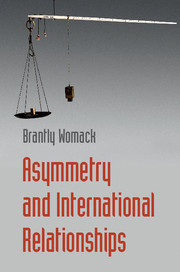7 - Asymmetric Prescriptions
from PART IV - POLICY IMPLICATIONS
Published online by Cambridge University Press: 05 December 2015
Summary
The foregoing chapters have presented the outlines of a general theory of asymmetry. The task of this chapter is to develop its implications for international behavior. Like all models of social reality, asymmetry theory makes the implicit claim that to act according to the model is realistic, and to act otherwise is unrealistic. Since asymmetry theory presents a complex situation involving power disparities, perceptual differences, and multilateral patterns, it is necessary to address explicitly its implications for intelligence, domestic dynamics, bilateral interactions, international norms, and structures of relationships.
In order to address the question of appropriate state action, we must first consider the state as an actor. As discussed in Chapter 1, the state is neither a unitary nor a final actor, but it is the authoritative decision maker in foreign affairs. Given the structural problems of mutual perception in asymmetric relationships, the first concern with the state as an actor is with its capability to perceive. Asymmetry theory argues that the disparity of capabilities creates a structural basis for international misperception and thus it has complex implications for national intelligence. Misperception is not simply factual incorrectness; it can be the failure to appreciate a different context of decision making. The intelligence ideal of having “a fly on the wall” to gather the intimate exchanges of another state will only produce a reliable strategic picture if the fly pays attention to the wall as well as to the conversations. However, since “our” interest in “them” derives from how they might affect our interests, it is a difficult epistemological leap to consider “them” within their own context. Hence Sun Zi's maxim “Know your enemy” remains forever young. While these problems are true of all states, in asymmetric bilateral relationships the tendency of the larger state toward inattention and that of the smaller toward overattention require specific intelligence antidotes.
Additionally, asymmetry affects entire political communities, media, and governments. Even though the state is the authoritative actor in foreign affairs, it is by no means a unitary actor with unlimited discretion. While the domestic constraints on state action are particularly obvious in multiparty political systems, even an autocratic ruler must be concerned in the long term with the public perception of state actions and effects on domestic political forces.
- Type
- Chapter
- Information
- Asymmetry and International Relationships , pp. 203 - 228Publisher: Cambridge University PressPrint publication year: 2015



